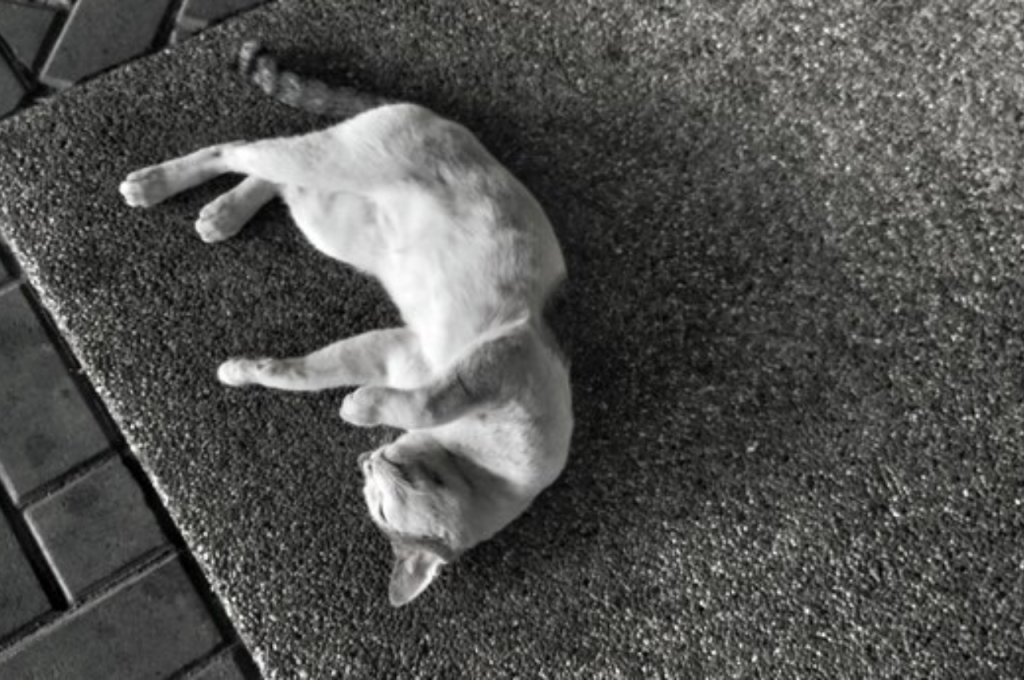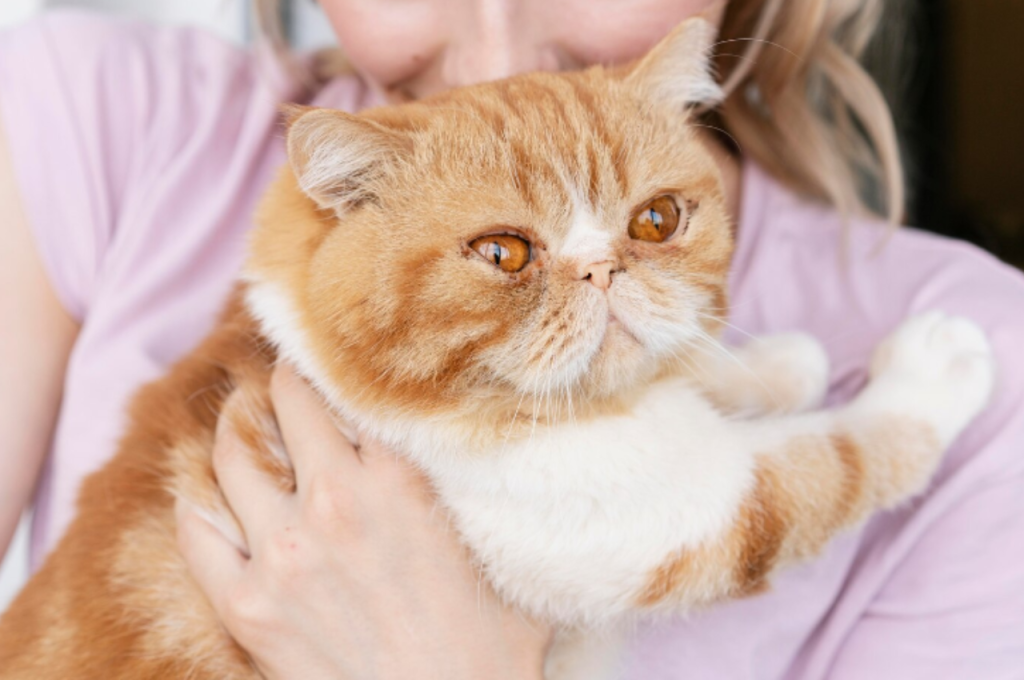If your cat dies at home, contact a vet for guidance on next steps. Consider burial or cremation options.
Losing a beloved pet can be a devastating experience for any pet owner. When a cat passes away at home, it is important to handle the situation with care and sensitivity. It is crucial to know what steps to take in such a situation, as it can be overwhelming and emotional.
In this blog post, we will discuss what to do if your cat dies at home, including how to handle the body, options for burial or cremation, and how to cope with the loss. By being prepared and informed, you can navigate this difficult time with compassion and respect for your beloved feline companion.
Experiencing Loss: The Immediate Aftermath
Experiencing the loss of a beloved pet can be an overwhelming and deeply emotional time. The immediate aftermath of your cat passing away at home may leave you feeling lost and unsure of what to do next. It’s important to take things step by step and find ways to cope with the initial shock and grief.

Finding Comfort in Rituals
Creating rituals can provide a sense of comfort and closure during this difficult time. Consider holding a small ceremony to honor your cat’s memory, whether it’s lighting a candle, saying a few words, or creating a memorial. These rituals can help you express your emotions and begin the healing process.
Creating a Peaceful Space
It’s essential to create a peaceful and serene environment in your home to process your emotions. Designate a quiet area where you can reflect on your memories with your cat and find solace. Surround yourself with items that bring you comfort, such as photos, blankets, or mementos of your cat.
Confirming The Passing
Losing a cat can be devastating, especially if they pass away at home. If this happens, it’s important to confirm their passing by checking for signs such as lack of breathing and heartbeat. From there, you can decide on how to handle the situation, whether it be to bury them or have them cremated.
Losing a beloved pet can be a heartbreaking experience, and when your cat passes away at home, it’s important to take the necessary steps to confirm their passing. By recognizing the signs and seeking veterinary confirmation, you can ensure that your cat receives the proper care and attention during this difficult time.
Signs to Look for
When your cat passes away at home, there are several signs to look for that can help confirm their passing. These signs may include:
- Lack of Response: Your cat may not respond to stimuli, such as touch or sound, indicating that they have passed away.
- Absence of Breathing: Check for any signs of breathing, such as movement of the chest or stomach. If there is no breathing, it may indicate that your cat has passed away.
- Dilated Pupils: Examine your cat’s eyes and look for dilated pupils, which can be a sign of death.
- Stiffness: After death, your cat’s body may become stiff, a condition known as rigor mortis.
This rigidity is caused by a chemical reaction in the muscles and can help confirm their passing.
Seeking Veterinary Confirmation
Once you have observed these signs, it is important to seek veterinary confirmation to ensure that your cat has indeed passed away. Contact your veterinarian and inform them of the situation. They may provide guidance on what to do next and may ask you to bring your cat’s body in for examination. During this difficult time, it is crucial to handle your cat’s remains with care and respect. Your veterinarian can provide guidance on the proper disposal methods, such as burial or cremation, in accordance with local regulations.
Remember, grieving the loss of a pet is a natural process, and it’s important to take the time to mourn and heal. Reach out to friends, family, or support groups who can provide comfort and understanding during this challenging time. By confirming the passing of your cat and seeking veterinary confirmation, you can ensure that your beloved pet receives the respect and care they deserve. Although it is a painful experience, remember that you provided a loving and caring home for your cat, and their memory will always live on in your heart.
Moments of Reflection: Saying Goodbye
Personal Goodbyes
Saying goodbye to a beloved feline companion can be an incredibly emotional and challenging experience. For some individuals, it’s important to have a personal moment to say goodbye. This can involve spending time alone with the cat, expressing love, and sharing final words or thoughts. Creating a small memorial, such as lighting a candle or placing a favorite toy nearby, can also provide comfort during this difficult time.
Including Family Members
Involving family members in the goodbye process can offer a sense of shared support and understanding. Encourage each family member to express their feelings and memories with the cat. This shared experience can foster a sense of connection and provide comfort during the grieving process. Creating a collective memorial or holding a small ceremony together can also help each family member honor the memory of their beloved pet.
Deciding on Next Steps
When your cat passes away at home, it can be overwhelming. Firstly, take a moment to grieve and say goodbye. Then, consider options like pet cremation or burial in a special place to honor their memory. Seek support from loved ones during this difficult time.
Burial Options
When your beloved cat passes away, one of the decisions you’ll have to make is how to handle their remains. Burial is a common option for pet owners who want to create a lasting memorial and keep their cat close to home. There are a few factors to consider when deciding on the best burial option.

First, you’ll need to choose a suitable location for your cat’s final resting place. This could be in your backyard, a pet cemetery, or another meaningful location. Ensure that you have permission if you plan to bury your cat somewhere other than your property.
Next, you’ll want to consider the method of burial. There are a few different options available:
- Traditional Burial: This involves digging a hole in the chosen location and placing your cat’s body in it. You may choose to wrap them in a shroud or place them in a casket. It’s important to dig the hole deep enough to prevent other animals from disturbing the burial site.
- Pet Caskets: If you prefer a more formal burial, you can purchase a pet casket. These come in various sizes and designs, allowing you to choose one that best suits your cat’s personality and your preferences.
- Memorial Markers: Consider placing a memorial marker or headstone at the burial site to honor your cat’s memory. This can be a simple engraved stone or a personalized marker that reflects their unique personality.
Remember to check local regulations regarding pet burial to ensure you comply with any applicable laws or restrictions. Taking the time to thoughtfully choose the burial option that feels right for you and your cat will help bring a sense of closure and peace during this difficult time.
Cremation Services
If burial is not the right choice for you and your cat, another option to consider is cremation. Cremation provides a way to preserve your cat’s memory without the need for a physical burial site. There are a few different types of cremation services available:
- Private Cremation: With private cremation, your cat is cremated individually, ensuring that you receive only their ashes. This option allows you to keep your cat’s ashes in an urn or scatter them in a location that holds special meaning for you.
- Communal Cremation: Communal cremation involves the cremation of multiple animals together. In this case, the ashes are typically not returned to the owner. Instead, they may be scattered in a designated area or handled in an environmentally friendly manner.
- Memorialization: Many cremation services offer additional options for memorialization, such as creating personalized urns or jewelry that incorporate a small portion of your cat’s ashes. These keepsakes can provide comfort and a tangible reminder of your beloved pet.
When deciding on a cremation service, consider factors such as cost, location, and the reputation of the provider. It can also be helpful to read reviews or seek recommendations from others who have used their services.
Preparing for Burial or Cremation
If your cat passes away at home, it’s important to know how to prepare for their burial or cremation. Take the time to research local regulations and options, such as contacting a veterinarian for guidance or considering pet cremation services. Remember to handle their remains with care and respect during this difficult time.
Gentle Handling
When handling your deceased cat, be gentle and respectful. Avoid sudden movements or rough handling that can cause harm.
Choosing a Container or Urn
Select a container or urn that fits your cat’s size and your preferences. Consider a biodegradable option for a natural and eco-friendly choice. After your cat passes away, you may choose to bury or cremate them. Both options involve specific considerations and preparations.
Here are some steps to take when preparing for burial or cremation:
- Decide whether to bury your cat in your yard or a pet cemetery.
- Contact local authorities to ensure compliance with regulations.
- Choose a suitable location for burial or a reputable crematorium.
- Prepare a small grave or choose an urn for cremation ashes.
- Consider holding a small ceremony to honor your cat’s memory.
- Personalize the burial or cremation process to reflect your cat’s life.
Memorializing Your Cat
In the unfortunate event that your cat passes away at home, you can consider memorializing them in a special way. You may choose to bury your cat in a peaceful spot in your yard or opt for cremation. Another option is to create a memorial with a personalized marker or a keepsake, such as a piece of jewelry made with their ashes.
Losing a beloved pet can be a heartbreaking experience. Memorializing your cat can be a way to honor and remember your furry friend. Creating a memorial or participating in commemorative activities can help you cope with the loss and keep the memory of your cat alive. Here are some ways to memorialize your cat.
Creating a Memorial
Creating a memorial for your cat can be a way to honor their memory and provide comfort during a difficult time. Here are some ideas for creating a memorial:
- Plant a tree or flowers in your yard in memory of your cat.
- Create a photo album or scrapbook of your cat’s life.
- Make a shadow box with your cat’s collar, favorite toy, and a photo.
- Order a personalized memorial stone or statue with your cat’s name and dates.
- Donate to a local animal shelter or charity in memory of your cat.
Commemorative Activities
Participating in commemorative activities can also help you cope with the loss of your cat. Here are some ideas for commemorating your cat:
- Host a memorial service or ceremony to honor your cat’s life.
- Make a donation to a local animal shelter or charity in memory of your cat.
- Volunteer at an animal shelter or rescue organization in memory of your cat.
- Create a memorial video or slideshow with photos and videos of your cat.
- Write a poem or story about your cat and their life.
In conclusion, creating a memorial or participating in commemorative activities can help you cope with the loss of your cat and keep their memory alive. Choose the memorial or activity that feels right for you and your cat. Remember that it’s okay to grieve and take the time you need to heal. Your cat will always hold a special place in your heart.
Navigating Grief
Navigating the grief of losing a beloved pet can be an overwhelming and deeply emotional experience. It’s important to allow yourself the time and space to process your feelings and find healthy ways to cope with the loss. Here are some steps you can take to navigate through this difficult time.
Seeking Support
During this challenging period, it’s crucial to seek support from friends, family, or even a support group for pet loss. Sharing your emotions and memories with others who understand can provide comfort and help you feel less alone in your grief.
Remembering The Joy
Take time to cherish the joyful moments you shared with your cat. Reflecting on the love and happiness they brought into your life can be a healing and uplifting experience. Consider creating a special memorial or keepsake to honor their memory.
Caring for Other Pets
If your cat dies at home, it’s important to handle the situation with care and sensitivity. First, ensure that your cat has passed away by gently checking for signs of life. Once confirmed, you can contact your veterinarian for guidance on next steps, including options for aftercare and burial. If necessary, arrange for the removal of your cat’s body and inquire about cremation or other memorial services. Take time to grieve and consider seeking support from friends, family, or pet loss support groups. It’s also helpful to reflect on your cat’s life and the joy they brought you.

Recognizing Their Grief
Observe your other pets for signs of distress or confusion. Increased agitation, loss of appetite, or withdrawal can indicate that they are grieving the loss of their feline friend. Provide them with extra attention and comfort to help them through this difficult time.
Maintaining Routine
Stick to your pets’ regular feeding, play, and exercise schedules. Consistency and normalcy can help reassure them during this period of change. By maintaining their daily routine, you can provide a sense of stability and security for your other pets.
Conclusion
Losing a beloved pet is never easy, and the death of a cat can be a particularly difficult experience. If your cat dies at home, it’s important to take the time to grieve and process your emotions. You may also need to take care of practical matters, such as disposing of your cat’s body.
Remember that there are resources available to help you through this difficult time, including pet loss hotlines and support groups. Above all, be kind to yourself as you navigate this challenging experience.
